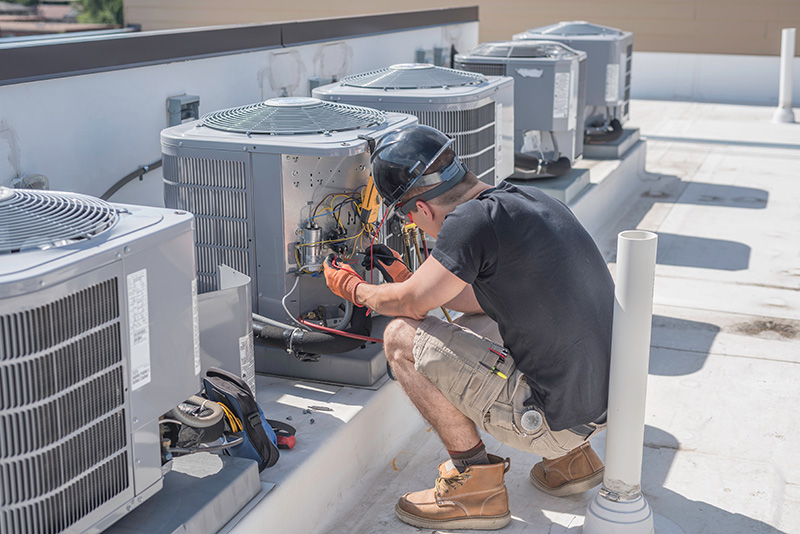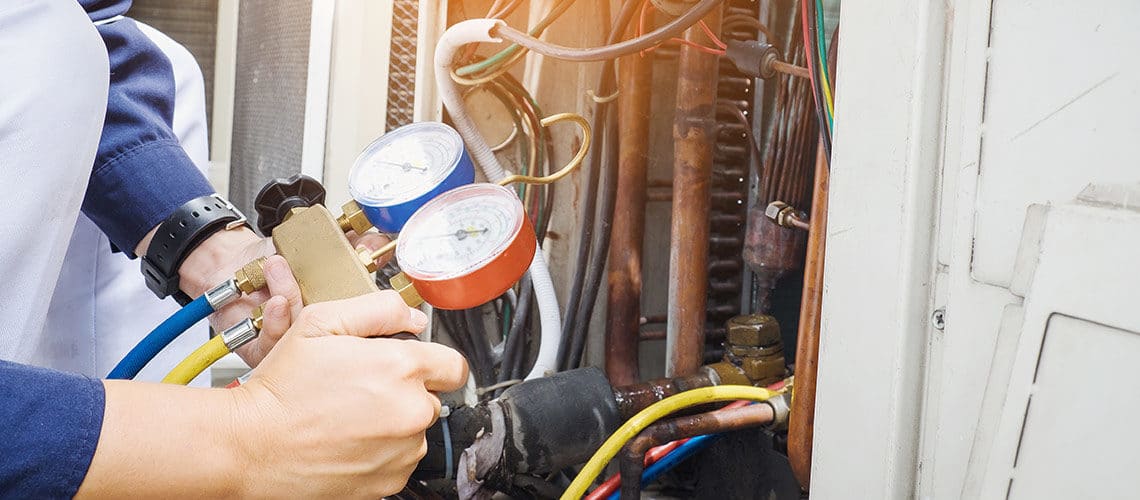Trust DMAKS HVAC for Expert Heating and Cooling Solutions.
Wiki Article
How to Pick the Right Cooling And Heating System for Your Requirements
Choosing the ideal cooling and heating system is a critical decision that requires cautious consideration of different aspects. Begin by assessing your home's dimension, design, and unique demands, as these components dictate the required capability and arrangement of the system. In addition, developing a budget that encompasses setup and long-term operational prices is important. As you consider your options, comprehending energy performance scores and the ramifications of your local environment will play a considerable function in your option. However, the myriad of system kinds offered can complicate this procedure, leading one to ask yourself which course eventually results in optimum comfort and efficiency.Evaluate Your Home Size
Analyzing your home size is an important very first step in choosing the appropriate cooling and heating system. The size of your home straight affects the cooling and heating capability needed for reliable environment control. An a/c system that is as well small will certainly have a hard time to keep comfy temperature levels, bring about enhanced energy consumption and use on the device. Alternatively, an extra-large system can cause short biking, inadequate moisture control, and ineffective procedure.
To precisely examine your home size, measure the square video of each area, taking into consideration variables such as ceiling elevation and the design. Additionally, consider the insulation top quality and the variety of home windows, as these components impact thermal performance. Homes with open layout may call for different system setups compared to those with many split spaces.
Making Use Of the Handbook J tons estimation approach can offer a more specific quote of your heating and cooling needs. This method make up numerous factors, including neighborhood environment, solar gain, and occupancy patterns. By carefully reviewing these aspects, you can make certain that your selected HVAC system is suitably sized, resulting in enhanced comfort, power performance, and long life of the equipment.
Determine Your Spending Plan
Determining your spending plan is a critical action in the heating and cooling system option procedure, as it sets the specifications for your options - DMAKS HVAC. A cooling and heating system is a considerable financial investment, and understanding your monetary limitations will certainly assist limit options that fit within your methodsBegin by evaluating not just the initial acquisition price yet also setup prices, which can vary substantially relying on the complexity of the project. Moreover, take into consideration ongoing costs such as upkeep, repairs, and energy usage. A system might show up cost effective initially however can bring about greater costs over time if it is less effective.
It is a good idea to allot a contingency fund for unforeseen costs that may develop throughout installment or first system changes (DMAKS HVAC). In addition, discover funding alternatives or rebates that might be readily available, as these can reduce the burden of upfront costs
Eventually, having a clear budget plan enables you to involve with cooling and heating specialists better, guaranteeing you receive tailored advice that straightens with your economic goals and home needs. By being diligent concerning your budget, you can make enlightened decisions that enhance comfort without compromising monetary stability.
Evaluate Energy Performance
wikipedia reference Power efficiency plays a vital function in the general efficiency and cost-effectiveness of your HVAC system. When picking a system, it is vital to consider its energy effectiveness rankings, as these figures straight impact your energy bills and ecological impact. Search for systems with a high Seasonal Power Efficiency Proportion (SEER) for cooling and a high Annual Fuel Usage Effectiveness (AFUE) ranking for heating. Greater ratings show higher efficiency, implying more comfort for much less energy consumption.In addition, take into consideration the Power Star certification, which represents that the system satisfies rigid efficiency guidelines set by the Epa. Purchasing a Power Star-rated HVAC system can lead to significant savings over time, particularly in areas with severe temperature changes.
An additional variable to examine is the system's size and capability. An oversized or small device can bring about ineffectiveness and boosted energy costs. DMAKS HVAC. Proper sizing, commonly determined with a Hand-operated J lots calculation, makes certain that the system runs at optimum effectiveness


Take Into Consideration Climate and Environment
When choosing a cooling and heating system, it is critical to think about the neighborhood environment and ecological conditions, as these elements considerably affect the system's efficiency and efficiency. Various areas experience varying temperature level extremes, humidity levels, and seasonal changes, every one of which influence heating and cooling needs.
Additionally, regional environmental variables, such as air quality and prospective irritants, need to notify your option. Systems geared up with sophisticated purification innovations can help alleviate pollutants and offer cleaner air. Additionally, consider the energy sources available in your area-- some a/c systems are extra efficient when powered by all-natural gas or renewable resource sources.
Ultimately, aligning your heating and from this source cooling system option with your local climate and environmental considerations will result in enhanced convenience, boosted efficiency, and reduced power prices.
Explore System Types and Functions
As home owners look for to maximize convenience and effectiveness, discovering the different kinds of HVAC systems and their distinct features becomes necessary. The main types of heating and cooling systems include central air, warmth pumps, ductless mini-split systems, and click furnaces. Each system uses unique benefits tailored to different requirements and choices.Central air systems supply consistent air conditioning throughout a home, making them suitable for bigger areas. Heatpump act as both heating and cooling solutions, using electrical power to transfer heat, which can lead to reduced power expenses. Ductless mini-split systems are becoming progressively popular as a result of their versatility and convenience of installment, allowing property owners to control the temperature in specific areas without substantial ductwork.

Final Thought
In verdict, picking the appropriate heating and cooling system necessitates cautious consideration of different variables, consisting of home dimension, budget constraints, energy effectiveness, regional climate, and readily available system kinds. A thorough assessment of these elements guarantees ideal comfort and cost-effectiveness. By complying with a structured method, house owners can make enlightened decisions that line up with their particular requirements and preferences, eventually resulting in improved indoor air quality and energy savings.Report this wiki page